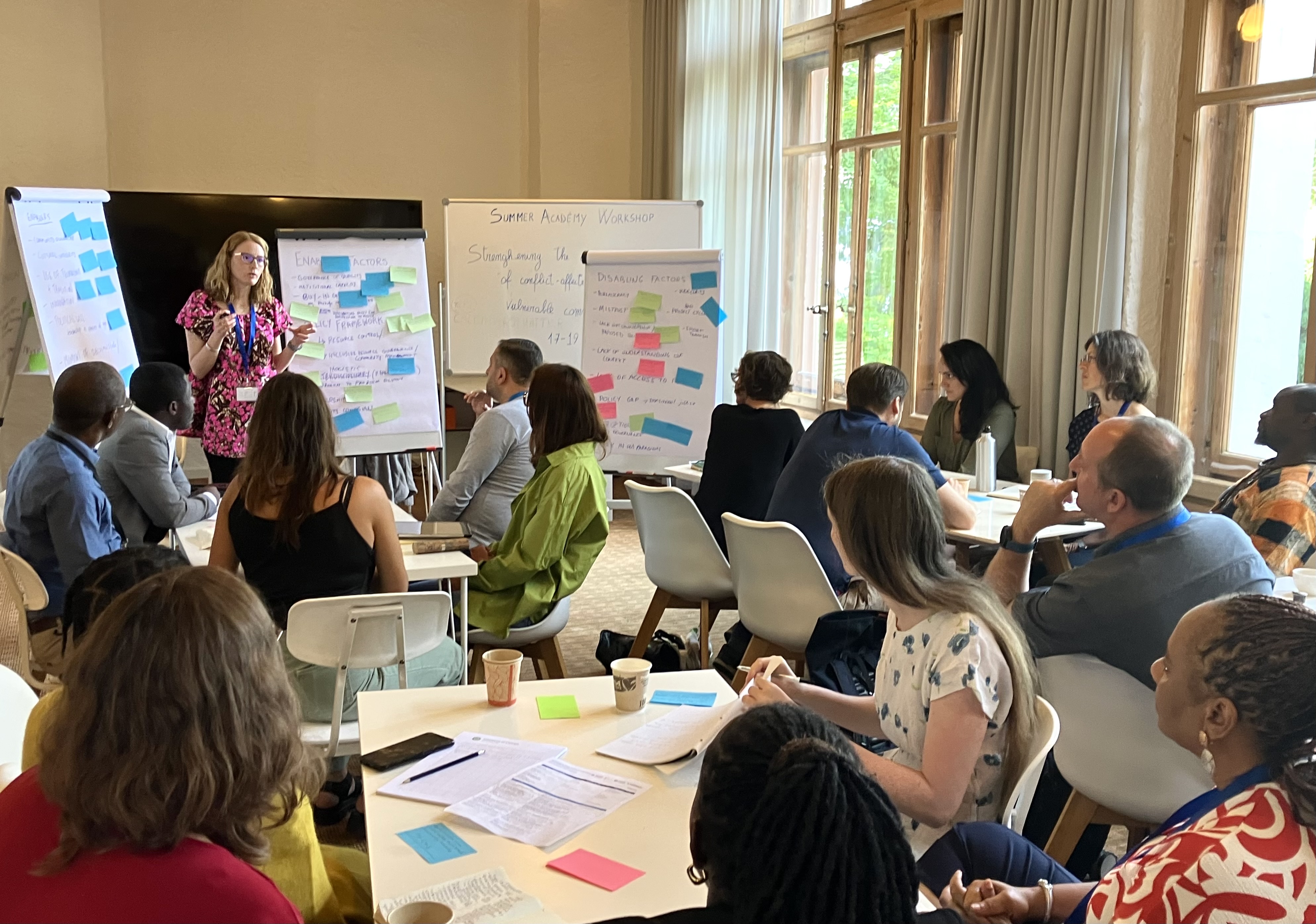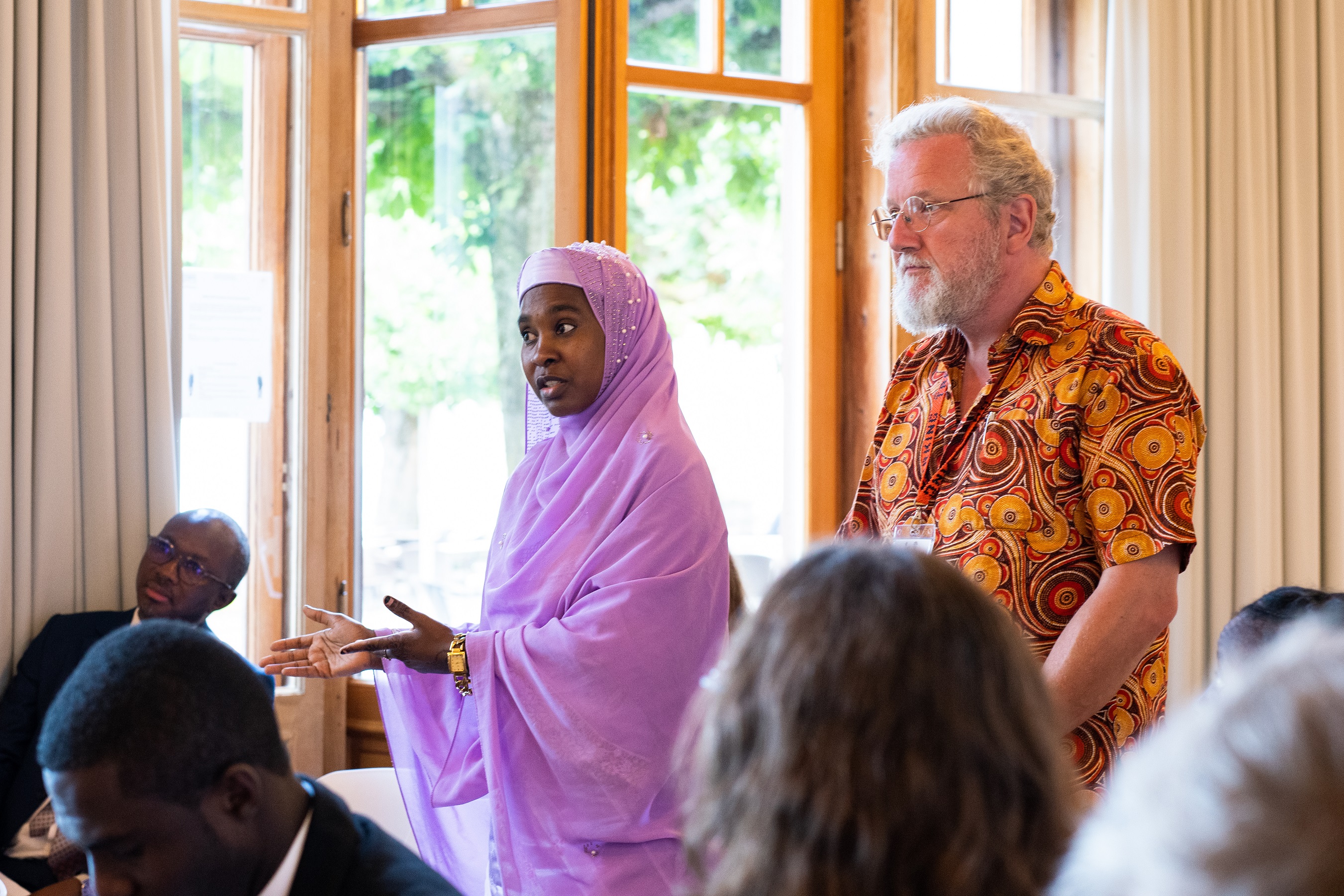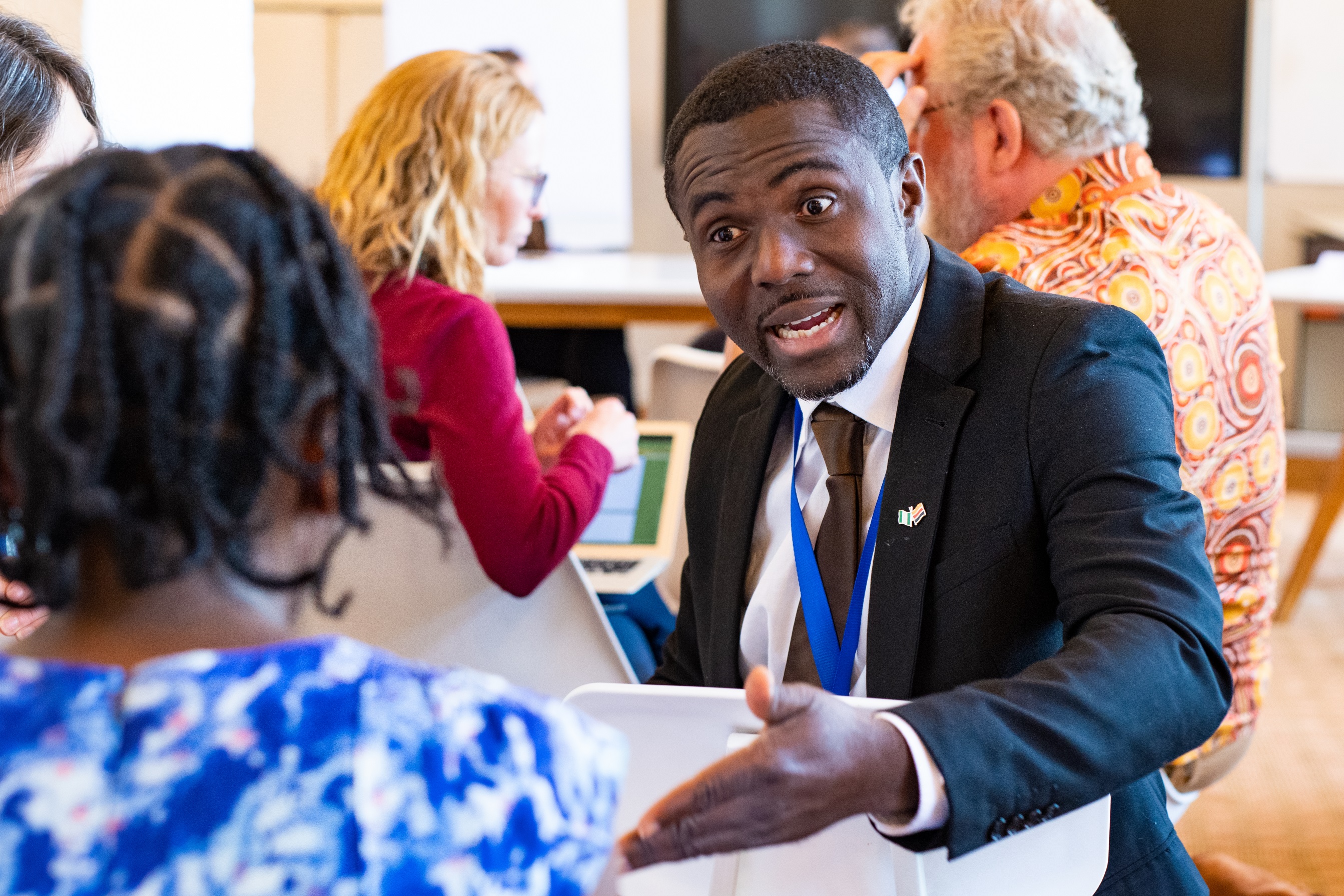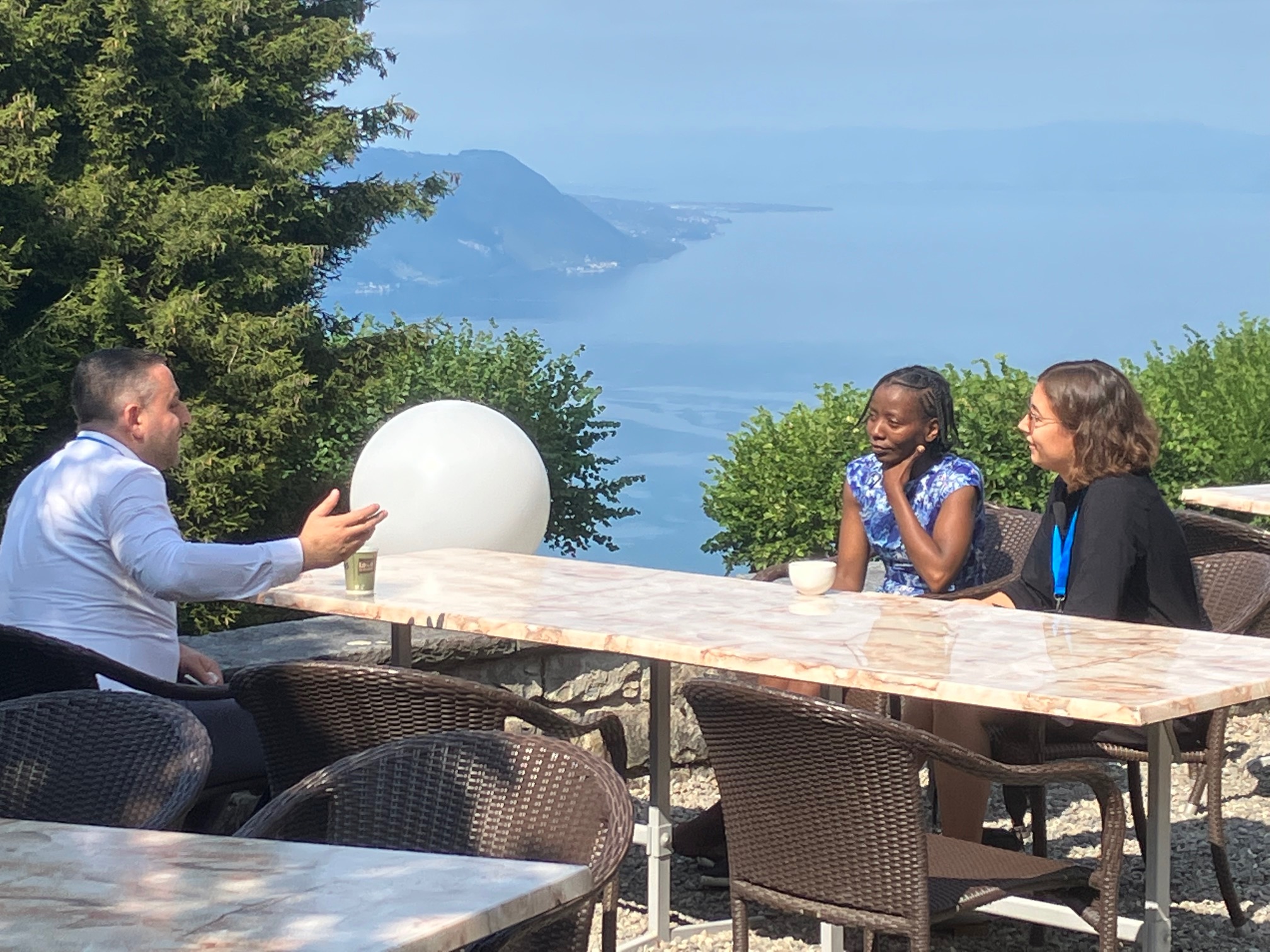Fostering collaborative solutions
Climate change, as a global problem that transcends geographical, social, and political barriers, is a rallying cry to unite against a common challenge. Despite this - or perhaps because of it - climate change is exacerbating pre-existing conflicts and exposing fractures in political and social fabrics— mistrust within and between countries; a lack of collaboration between sectors and disciplines; gaps in cultural understanding and knowledge; a mismatch between the priorities of funders and affected communities; and flaws in economic structures.
The 2023 workshop of the ‘Summer Academy on Land, Security, and Climate’ brought together 23 participants from five continents and sectors as diverse as governments, international research organisations, local and international NGOs, and grassroots initiatives to brainstorm solutions for ‘strengthening the climate resilience of conflict-affected and vulnerable communities’. The three-day programme was convened at the Caux Palace, Switzerland, in parallel with the Caux Forum, by the Geneva Centre for Security Policy, Initiatives of Change, and Triple Capital, in collaboration with the Geneva Peacebuilding Platform, and Earthbanc.
Having such rich diversity of perspectives and expertise in one room was an unusual opportunity; ‘silo-busting’ at its best. When asked their hopes and expectations for the workshop, several participants emphasised the need to move from talking to doing and from policy to practical implementation. There was a wish to become more than a sum of individuals and to harness the collective potential in the room. One participant hoped to experience ‘some beautiful disruption’, and many expressed a readiness to challenge their own assumptions in the hope of shifting the dominant paradigms of the humanitarian, development, and climate sectors.
Participants presented case studies from their own work - out of which patterns began to emerge that threw into relief both the enabling and the disabling factors for building resilience to climate change.

Good governance and effective relationships between communities and political structures often plays a crucial role. This was evidenced by the case of Bhutan, where the government’s five-year economic strategy is based on the results of the Gross National Happiness (GNH) survey, which—as a senior researcher at the Centre for Bhutan and GNH Studies explained—is measured by collecting data from every household in the country on individuals’ contentment in nine domains, of which ecological resilience is one.
She presented a case where a village in southern Bhutan had been experiencing land degradation resulting in landslides and loss of livestock. The local leader reported this to the district level, which led to the establishment of a community-led project to implement a sustainable land management plan supported by a UN agency. The project’s success was largely thanks to effective leadership and social cohesion, which made it possible for the local, district, and international levels to be bridged without a mismatch in priorities. The local leader was tasked with resolving any disputes that might arise.
In response to the example of Bhutan, both a grassroots activist and committee member of Farmers Dialogue International from the Democratic Republic of Congo and a PhD student from northern Cameroon observed that there used to be traditional community structures for dealing with disputes over land and resources in their countries, but that colonial and postcolonial attempts to impose modernisation and Western-style democracy have caused a split between traditional and political authority, weakening the social fabric and allowing conflicts to proliferate. There was a strong sense in the workshop of the importance of decolonising mindsets and fostering local and indigenous solutions and practices.
A project coordinator for gender and natural resource governance with the Indigenous Movement for Peace Advancement and Conflict Transformation (IMPACT) in Kenya, explained how their project on environmental peacebuilding with Maasai pastoralists uses participatory approaches to foster collaboration with and between traditional bodies, such as councils of elders and mens’ and womens’ councils, with the aim of strengthening peace, natural resource management and livelihoods concurrently.

The co-founder of the Yolé! Africa Coalition explained how they have created a curriculum for deconstructing colonial mindsets through art, while also reviving indigenous agricultural and medicinal practices in the Congo Basin. A programme manager with the National Integration and Cohesion Commission of Kenya also stressed the importance of cognitive justice: the need to repair forms of epistemic oppression, such as discrediting and suppressing traditional knowledge, that have been a legacy of colonialism. She is working on introducing environmental restoration into the African Union’s transitional justice policy and raising awareness of the importance of the environment for building sustainable peace. Similarly, a representative of PeaceNexus emphasised the potential for conservation and peacebuilding organisations to collaborate to reduce conflict and promote partnerships between rangers and communities in and around protected landscapes.
It became clear that community-led, bottom-up initiatives are often the most successful, and that land rights—the rights to use, control, and own land—are a crucial factor for environmental restoration and climate resilience. In Mali, for example, farms have expanded into traditional transhumance corridors and rainfall patterns have changed, making traditional land use agreements between farmers and mobile pastoralists impracticable. As a former member of the UN’s peacekeeping force in Mali explained, disputes over access to land are an important recruiting force for violent extremist groups, which target young men who are marginalised within their own community and have few alternatives for economic upliftment. On the other hand, a humanitarian worker in Syria pointed out that the trade of agricultural produce such as olive oil fosters cooperation between Syria’s four divided administrative zones: agriculture can help build bridges across enemy lines.

The head of the unit that tackles disaster risk reduction linked to climate change for the International Organisation for Migration highlighted a new programme intended to break the climate-conflict cycle by supporting communities to forge climate-conscious conflict mitigation strategies. As part of this, IOM has developed a transhumance tracking tool, which uses GPS to monitor changes in movements of people and livestock across the Sahel and provide real time alerts via mobile phone to inform communities when herders are moving, with the aim of averting conflicts. IOM is also working increasingly closely with diaspora groups from climate-vulnerable contexts, helping to match their know-how and financial resources with community needs In their countries of origin.
In the Kafue River floodplain of Zambia, silvopasture combined with holistic grazing management has had positive ripple effects on pasture fertility, increased biodiversity, and a new abundance of wild fruit and mushrooms which communities are able to harvest. The approach works on community-owned land, reported a scientist from CIFOR-ICRAF, but only when there is sufficient trust between herders.
He went to explain how granting tree tenure to farmers in Niger has allowed them to prune tree stumps and thereby regenerate the trees through Farmer-Managed Natural Regeneration (FMNR), making it possible for farmers to reap both the livelihood benefits and the ecosystem services of traditional agroforestry parklands. The spread of FMNR eventually led to the repeal of a colonial law that, in a misguided attempt to protect trees, had prohibited local people from having control and ownership over trees on their own land - an important example of policy following a grassroots initiative. A Nigerian forestry consultant and Senior Fellow of the Global EverGreening Alliance shared how he had spearheaded an initiative to take a delegation of Nigerian farmers and local government officials from northern Nigeria across the border to Niger, in order to learn from their neighbours’ success with FMNR.

Drawing on all the case studies and everyone’s perspectives and experience, the group came together on the final day of the workshop to distil the main factors for success if climate resilience is to become a reality for conflict-affected and vulnerable communities. There was a renewed sense of the power of dialogue to harness the richness of diverse perspectives and of the potential of international and intersectoral collaboration to bridge the gaps that have been hindering effective action.
A policy brief containing recommendations for different stakeholders - governments, donors, NGOs, research organisations and community-based organisations - is now being prepared for circulation to the 90-strong Summer Academy alumni network, to the 500-strong Environment, Climate, Conflict and Peace Community of Practice of the Geneva Peacebuilding Platform, and to all the partner organisations of the workshop.
Photos by Leela Channer and Alan Channer